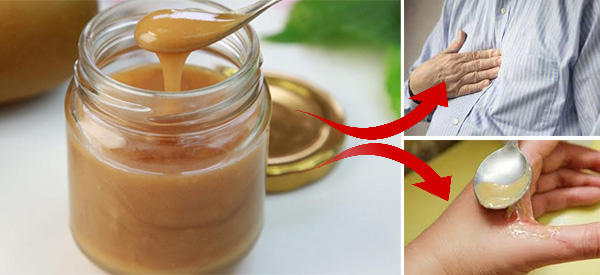One of the tricks that makes prepping easier is to stockpile things that have more than one use. Duct tape is the classic example, of course – it’s practically a miracle substance. Vinegar isn’t far behind. As well as being great for cooking or preserving food it’s also a powerful cleaner, and it works well for killing weeds. Don’t try catching flies with it, though; according to an old saying, honey works better for that.
Oh, right, honey. Do you have honey in your emergency stockpiles? A lot of preppers – maybe most – don’t. After all honey is just a sweetener, and sugar works pretty well for that too, so why duplicate? Well, here’s why: Honey might not have as many uses as duct tape or vinegar, but it’s still much more than just a sweetener. In a crisis situation it could literally save your life, because if you get the right honey it’s also a powerful, natural antibiotic.
In fact all honey has some antibiotic properties, so it’s worth having a good supply of it laid up (it stores well, too). If you want the maximum benefit, though, consider putting in a little extra effort to find and stockpile mānuka honey.
What’s the Difference?
Honey is a natural product made by bees. Worker bees collect sugary nectar from flowers, and process it into honey. In the process they add natural antibiotics. The bees do that so the honey will store well in the hive – the antibiotics will kill any microorganisms that could spoil it, so it gives them a long-lasting food reserve.
As far as bees are concerned, one batch of nectar is as good as another. That means honey is usually made of a mix of nectar from different plants. Sometimes, though, most or all of the nectar comes from one species of plant. These are called monofloral honeys, and they’re seen as a premium product. Often they’re prized for a distinctive flavor – fireweed honey and Appalachian sourwood honey are two of the most popular US varieties.
Of course, in a survival situation you’re probably not too worried about subtle flavors in your honey, but one monofloral has other advantages – and that’s mānuka honey.
Mānuka honey comes from New Zealand, where it’s produced by European honey bees from the nectar of the tea tree – mānuka in the Māori language. The result is a dark, viscous honey with a rich, complex taste. Although sweet, it has a slight bitter aftertaste. It doesn’t taste at all bad (and it works just fine as a sweetener) but it isn’t one of the most popular varieties among honey enthusiasts. On the other hand, it is incredibly popular as an alternative medicine.
Honey as Medicine?
There’s more to mānuka honey than just its distinctive taste. It also has some unique chemical properties that make it stand out from other honeys. It’s particularly rich in antioxidants, and has powerful anti-inflammatory and antibacterial properties. That means it has a lot of medicinal uses: here are a few of them:
- Treat wounds, sores and burns. Applying mānuka honey to a burn or wound, as well as some types of ulcer, can speed up healing, reduce inflammation and even relieve pain. Its antibacterial power helps prevent infection, too. Just make sure to cover the honey-treated wound with a dressing to keep insects away from it.
- Reduce bowel and intestinal symptoms. Experiments on rats show that mānuka honey protects against inflammatory bowel disease, and reduces symptoms if it’s already taken hold. The honey can reduce inflammation and fight bacterial infections.
- Tackle resistant bacteria. There’s some evidence that mānuka honey might even be able to fight bacteria like MRSA and Clostridium difficile, which are increasingly resistant to conventional antibiotics. In the case of MRSA there’s evidence that it can actually attack the genes that give the bacteria its resistance.
- Ease acid reflux. Acid reflux isn’t life-threatening, but it can be miserably painful. Mānula honey can relieve the symptoms.
- Fight gum disease. Untreated gum disease can lead to tooth loss and even bone damage – but where will you find a dental hygienist in a crisis? Mānuka honey’s antibacterial properties can reduce dental plaque by up to 35%, and also reduce bleeding from gingivitis and periodontal disease. The honey’s mineral content also promotes healthy teeth.
- Allergy remedy. Research from Finland shows that honey can reduce the symptoms of pollen allergies by up to 70%. Seasonal allergies can be crippling; honey could make enough of a difference to keep you on your feet and functional.
- Sleep aid. Mānuka honey, mixed with milk and drunk just before bedtime, promotes deep, unbroken sleep. This is vital for health – as well as leaving you well rested, good sleep can reduce the risk of heart disease and other serious conditions.
Any honey has health benefits, but mānuka honey is in a class of its own. It contains up to four times the concentration of many nutrients as other honey, so your supply will be more effective as a medicine and last a lot longer, too.
Related: The Best Natural Sleeping Pill That You Can Grow In Your Backyard
Get the Real Thing
Mānuka honey has become very popular as a health food and medicine – and demand is a lot higher than supply. That means a lot of what’s being sold as mānuka isn’t – either it’s been diluted with normal honey (and sometimes corn syrup) or there’s no actual mānuka in it at all. That doesn’t make a big difference if you just want something to spread on your biscuits, but if you’re planning to rely on its medicinal properties you don’t want to settle for counterfeit.
All real mānuka honey exported from New Zealand will have the “Unique Mānuka Factor” logo on the front of the jar, along with a UMF number. You need honey with a UMF number of at least 10, and 16 or higher is the best. This number comes from actual antibacterial tests of the honey, and is a reliable guide to quality and effectiveness. Any honey that isn’t marked as being produced in New Zealand, and doesn’t have both a UMF mark and a number, is not real mānuka, whatever the seller claims. Get the real thing, and add it to your survival stores.
You may also like:
 Why You Should Put Peppers In Your Socks
Why You Should Put Peppers In Your Socks
This Bug Will Kill Most Americans During The Next Crisis (Video)
How to Treat Migraines with an Herbal Tincture





















Don’t know a lot about this type of honey, thanks for the information. I have used local honey for years and it works for allergies in the spring for my wife and I. We take no medicine for allergies now at all, just honey. We also use it for minor burns and cuts, with great results.
There is always a jar in the house year round. I agree, keep honey on hand always.
Thank you for this informative article. Though we have a couple gallons of raw, unpasteurized honey, my daughter has mentioned Manuka honey several times, but I had not looked into it. Now I will!
I have several gallons of honey on hand, much of it from my own bees; but, I also have Manuka honey, purchased specifically for its medicinal properties and therefore used rather sparingly.
In your list under Honey as Medicine?
I find that such things as treating wounds, sores and burns or use as an allergy remedy are pretty standard even for regular local honey.
One thing you did not mention is that Manuka Honey has also had positive results when used to treat stomach ulcers, caused by H Pylori (Helicobacter pylori) bacteria, also known to be a cause of stomach cancer.
Its anti-inflammatory & antiseptic properties can also help reduce the pain of these stomach problems.
When we sent my daughter who is recently out of college and lives out of state some of my honey, she said she could taste the wild flowers she used to smell when growing up here on our rural property, so it can also be used for memory enhancement. LOL.
Olfactory memories are so cool, love that little story at the end.
Hear everything, believe nothing. But the evidence on honey as an effective wound treatment is absolutely believable, and it’s pretty danged cool that honey can do that.
There was an article on here a while back about sugardine, a slurry of sugar and Povidone iodine, and it has a long history as a wound treatment for horses, and has been found to be a very effective treatment for even serious wounds that are also infected.
Great and important stuff to know, thanks!
Raw local honey is best for you – the manuka honey may be good if raw, but if it has been exported from New Zealand, it has been pasteurized and all the good enzymes in it have been destroyed. Once again, raw and local is best, and the definition of local is if it has been gathered within 50 miles of your home.
I’m going to challenge you to start developing recipes that incorporate Environment based food ingredients in the mix. How about a recipe that incorporates Cat Tails, as an example. Let’s helpful articles that don’t sell products.
I have put bee pollen in local raw honey, turning the jar over everyday for 2 weeks. it’s supposed to be a superfood. just took my first teaspoon today. i believe it is more nutrient dense and full of vitamins and protein than anything listed in this article.
Just an aside for those wanting to know – Australia produces real Manuka Honey too.
The East Coast of Australia has the same plant – Leptospermum scoparium (teatree)- and the european honey bee, so we can (and do) produce REAL Manuka Honey as well.
Not having a go at our neighbours across the Ditch, but their adertising campaign isn’t quite true when they claim “the real thing only comes from New Zealand” – and a law suit against us calling our honey “Pure Manuka” proved us right. The Courts said its not a brand but a type of honey and we have every right to call ours “manuka”. So there you go.
And does have the “Unique Mānuka Factor” Number on the jar too.